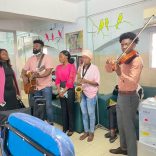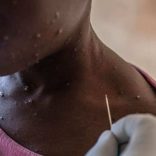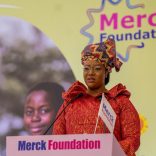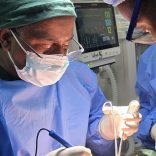Mozambique: First case of mpox diagnosed in Cabo Delgado
Bishop of Pemba: “It is not fair for Africa to be last in the vaccination process against Covid-19” – Listen

File photo: Rádio Renascença
In an interview with Rádio Renascença and Ecclesia News, Bishop of Pemba D. Luiz Fernando Lisboa asks the WHO to intervene to ensure an equitable distribution of the Covid-19 vaccine. The number of Covid-19 cases in Mozambique is increasing, worsening in particular the condition of those living in Cabo Delgado, in northern Mozambique.
The Bishop of Pemba, D. Luiz Fernando Lisboa, says that African countries cannot be ignored in the vaccination against Covid19.
“It is not fair for Africa to be last in the Covid-19 vaccination process,” the prelate of the diocese of Cabo Delgado region, in Mozambique says, in a joint interview with Renascença and the Ecclesia agency.
The Bishop of Pemba argues that it is “important that the WHO holds accountable the authorities and the developed countries to ensure a more equitable distribution of vaccines”.
In this interview, D. Luiz Fernando Lisboa also highlights the importance of the Church and particularly Pope Francis in denouncing “the war” in Cabo Delgado, since “at the beginning, there was an attempt to deny, to hide this war a little, this humanitarian crisis” which has already displaced more than 600,000 and killed more than 2,000.
The prelate says it is “possible that the conflict will end in a few months” due to “foreign aid, above all from the European Union” and thanks “Portuguese civil society”, in particular “the Catholic organisations” for everything they have done to help in the search for solutions to the humanitarian crisis.
D. Luiz highlights the efforts of the more than 30 Portuguese civil society organisations urging the Portuguese government and the European Union to get involved in the solution of the conflict in Cabo Delgado.
The bishop of Pemba is also very concerned about Covid-19 and reveals that the number of cases in Mozambique “is increasing in a frightening way”.
Regarding his native country, Brazil, D. Luiz Fernando Lisboa says that “it is justified” to ask for the resignation of Jair Bolsonaro, especially since “many deaths could have been avoided” if the denialist government had not treated the pandemic “almost as a joke”.
Listen here to the full interview with the Bishop of Pemba, D. Luiz Fernando Lisboa
Have you felt this willingness to help on the part of Portuguese civil society organisations make sense?
Yes, I have felt since … I will not say since the beginning of the war, but since the middle of the war here – and it [the war] has lasted for more than three years.
Portuguese civil society and, above all, several Catholic organisations, got in touch with us and started to do some kind of work in order to try to help us, so that we could respond to the humanitarian crisis, to the people who were displaced. The archdiocese of Braga, with whom the diocese of Pemba has a partnership, and other organisations have gradually become involved.
Do you feel this desire in the search for the best solutions for what you called war on the part of the Portuguese Government and the European Union?
I would say it took a while, but the important thing is that, now, the authorities are already getting involved. A few days ago, we had the visit of the Portuguese minister [Gomes Cravinho, Minister of Defence], representing the European Union. We also had contacts from other Portuguese authorities, both the Prime Minister and the President of the Republic, through phone calls and concrete gestures expressing their concern.
How do you describe the current reality in Cabo Delgado? Has the number of displaced people been increasing?
It continues to increase, because the war, unfortunately, continues. In recent days, we have had attacks in several cities – Palma, Macomia, Nangade. Few people had stayed, and with these attacks the tendency is for them to leave. Everyone is looking for a way out. Those who haven’t left, it’s because they cannot, because of finances – because they do not have the money to pay the chapas [minibuses], which have tripled their fares.
Others do not leave because they cannot leave. Those in Palma, for example, cannot leave by land. In another region, where they have attacked several times, no one can pass over land. The boats are very expensive and we must remember that, in December, a boat sank and many people died. Leaving by plane is very expensive, because they are small flights and the population has no chance of affording them.
Are there more than 500,000 displaced already?
Yes, I believe the number already exceeds 600,000.
What are the main needs of the population? Does the biggest concern remain the situation of children? Has it been easy to get help through?
It has not been easy. First, because there is not enough help for everyone. Second, we are in the rainy season. The people in the camps, especially in the Metuje region, 40 or so kilometres from Pemba, are under tarpaulins, in very precarious tents and now face – in addition to the lack of food, a decent place, etc. – also the problem of rain. This is my main concern. It is clear that, among the most vulnerable, our greatest concern is thechildren, because they are the ones who suffer the most.
It is very difficult to have enough help for everyone. The government has made an effort to resettle people. The idea is to move these people immediately, but this is not possible if the minimum conditions have not been created in the place where they go to: if there is no water, if there is not a minimum of organisation. It is not possible; it would be to move people to a worse place. Non-governmental organisations have asked the government to create the conditions to transfer people later.
On the part of the Mozambican authorities, who were initially reluctant to accept aid, is there now a different attitude?
Yes, against facts there are no arguments. In the beginning, there was an attempt to deny, hide this war, this situation, this humanitarian crisis. Then, with the word of the Church, who was always present, talking about the war, especially after Pope Francis started to come in, talking about the war, calling the bishop, he sent help … That was also very important. At the end of 2020, he sent significant aid, which motivated other Church organisations, dioceses, to make a similar gesture.
And on December 18, the Pope received me at the Vatican. That is another gesture, to show that he is concerned about the war, about this humanitarian crisis, and wants to see solutions from the authorities.
And what did that audience mean to you, what can you share with us from that meeting?
When I was called, I thought our meeting would last three to five minutes. In fact, it was 45 minutes. The Pope took an interest, listened to everything I had to tell, asked many questions and clearly showed his closeness to the people of Cabo Delgado. And, of course, not only, there are wars in other regions that have worried the Holy Father. But, at that moment, specifically, he wanted to know about the people of Cabo Delgado, showed his closeness and said that he would continue to pray and help those people.
https://rr.sapo.pt/2021/01/30/religiao/mocambique-mostra-a-pobreza-no-seu-expoente-maximo/noticia/224742/
In one of the interviews you gave, you said that “no one will silence the Church”. Did you refer to any particular situation?
Everywhere and at all times, they have often tried to silence the Church. There are people who mistakenly think that the Church or religious leaders should be left alone within the Church to pray. And evangelisation goes far beyond that. It’s much more than that.
We do not work with people’s spirit. We work with concrete people, who have difficulties, who experience violence, limitations, who have needs. Then, the Church, anywhere, will raise its voice and, at some point, it will be the voice of those who have no voice. And it can be discomforting. So, this has always happened at all times. It is normal that this happens.
What are the challenges facing Catholic communities?
We had to reinvent ourselves. This is a word that is used a lot in this time of the pandemic, but we also use it for the question of war. Our entire ministry had to be adapted to the situation we are experiencing. Both the war, and now Covid-19, which also increased in Mozambique, unfortunately. So, all the missionaries who were in the war-affected region had to leave and were relocated to other regions in the province. And we are practically all working for the displaced; attending, visiting, looking at the needs, gathering these people to provide support, psychological support, in short, what they need most. And even outside the province; the neighbouring dioceses of Nacala, Nampula, have also helped because they have received people from Cabo Delgado.
Can the conflict – the terrorist acts – end soon? Or are we going to continue to have many more people displaced by the fear that violence entails?
Perhaps it is possible with the foreign aid that we are now beginning to have, especially from the European Union and the region. It is possible that this conflict will end in a few months, although I cannot quantify the time …
But is there a new hope?
There is a new hope. However, this situation of the displaced is not resolved in a magical step. They are people, lives, stories, and as I have said it will take us many years to rebuild. Because It is not just about reconstructions of houses, buildings, but reconstructions of people, of lives and of stories. And that will take a a lot of work, for the government, for civil society, for international organizations, for the Church. We have a lot of work ahead of us.
There are reports of an increase in cholera and an increase in the pandemic crisis in the territory. Will we be close to a perfect storm?
Unfortunately, we usually have these cholera situations annually, but conditions are ripe for it [cholera] to increase much more because of crowding, lack of sanitation, lack of treated water. These are conditions which end up helping these situations to emerge.
We used to say that Covid for us was in the background, but the number of cases in Mozambique is increasing in a frightening way. We already have several cases in Pemba, and people who have contracted it in our missionary team. So, the situation is getting worse, unfortunately. Because, in addition to dealing with the whole situation of the war, we have Covid and we have these situations of cholera and others.
One of the Pope’s concerns has been an equitable distribution of vaccines. In Portugal, the process has already started; also in Brazil. Would it be important for the so-called “developed world” to look at the poorest countries and also be concerned with vaccination in those countries?
Surely. I think that countries have the right to look after their citizens, but no country can only look after itself, only from within. It is not fair for countries to rush to vaccinate their entire population and for Africa to wait until they finish.
But is this a risk?
There is this risk, yes, the risk that Africa will be last. That’s not fair. We have problems like everyone else has, we still have problems because of the exploitation in Africa. It is not fair for this to happen. It is important that the WHO [World Health Organization] holds authorities accountable – holds the most developed countries accountable to redistribute, so that there is a more equitable distribution of vaccines.
Finally, we know that, for personal reasons, you had to travel to Brazil. The country is also experiencing an unprecedented health crisis and there are also movements of strong opposition to the Bolsonaro government. We heard that some religious leaders in Brazil filed a dismissal request against the president for alleged negligence in combating Covid-19, in a document signed by 380 people, including bishops and pastors. How would you rate the situation in your home country?
The situation in the country, in Brazil, is dire. I think that many deaths could have been prevented if there had been greater communication from the central government with the population, an incentive to the population for proper care. What happened was a denial, almost a joke with the pandemic, and the result is there. There are about 60 requests for the impeachment of the president in the Chamber of Deputies. And now, a group of religious leaders has signed yet another request for impeachment, which is justified because the result of the debauchery, the way the pandemic was treated, is now showing. So much so that the government now has a position totally contrary to the one it had initially. So, this shows not only that the government here, but in other parts of the world, also, had to change their opinion, because this pandemic is not something to play with. It’s not what they took it for in the beginning.
- Interview by Henrique Cunha (Renascença) and Octávio Carmo (Ecclesia)












Leave a Reply
Be the First to Comment!
You must be logged in to post a comment.
You must be logged in to post a comment.